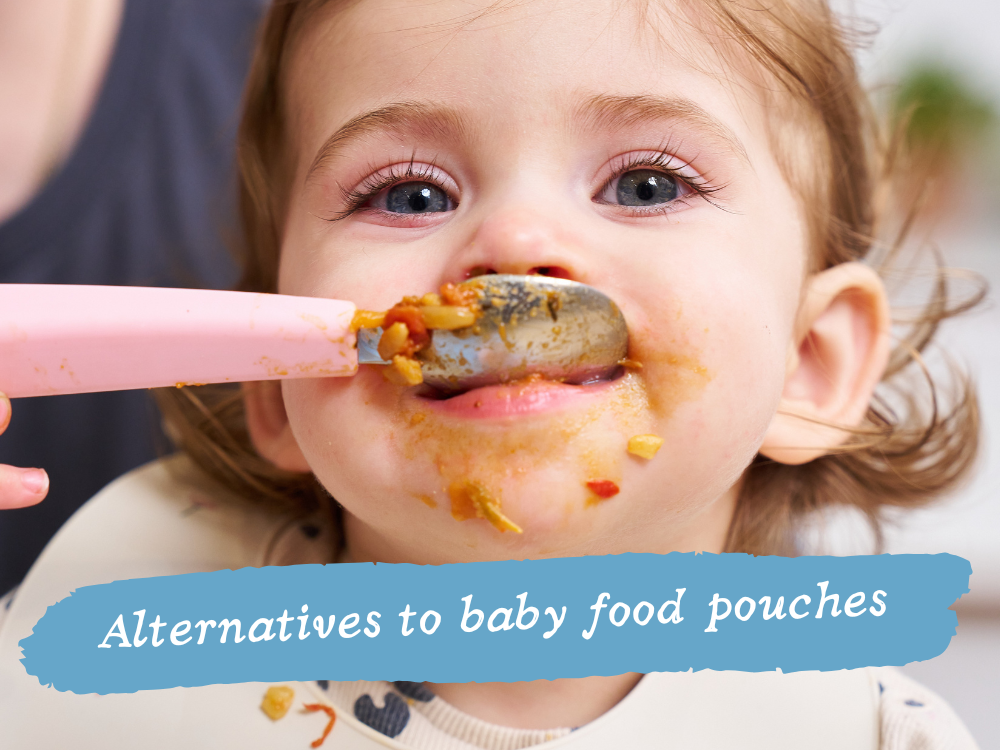You won't be alone if you’re feeling overwhelmed, guilty, worried or even angry after this week’s revelations about commercial baby food pouches. We asked Lucy Upton, our resident dietitian, for her practical tips if you’re one of those parents who is asking themselves, ‘what on earth do I feed my child now?!’.
“First and foremost, parents must understand that they haven’t done anything wrong and that it’s highly unlikely that your baby or child’s overall nutritional status, growth or relationship with food will have been impacted by using these foods as part of a varied weaning diet. The demands of the parenting world are higher than ever, and we all turn to convenience in various aspects of our daily lives, which can include when feeding children. Parents should, however, have access to products that prioritise their child’s health, and are transparent about how they are made, what they contain and how this relates to children’s unique nutritional and feeding needs.”
Read on for some of Lucy’s practical tips and swaps.

Why are we suggesting alternatives to baby food pouches?
While they can be helpful occasionally (we’ve all been there!), baby food pouches aren't ideal to replace whole and family foods. Here’s why:
-
Developmental concerns: Sucking purees from a pouch doesn’t help babies practice the chewing and oral motor skills they need for speech development and transitioning to a balanced and varied diet.
- Low in critical nutrients: Babies have unique nutritional needs, unlike any other time in life. They have high needs for essential nutrients like iron, for brain development and growth, and Omega-3 fats for brain health. Baby food pouches have been found to be very low in these nutrients, which is a concern if they are relied upon for nutrition.
- Hidden sugars: Even "natural" or "organic" pouches can be loaded with fruit purees (considered a free sugar, as the natural fruit sugars have escaped the cell walls), making them surprisingly high in sugar, up to 4 teaspoons in some cases! This can have significant implications for babies' teeth, and energy intake.
- Eating too quickly: Pouches can become food on autopilot. Young children may not learn to recognise their hunger cues or engage with food in a meaningful way, as the texture of food and ease of consumption can make it easy to overconsume or consume quickly.
- Environmental impact: Most pouches are not recyclable, resulting in excess plastic waste
-
Cost: They are actually much more expensive compared to a fresh apple or banana for example, a 70-80g banana pouch can cost up to £1, but a medium banana may set you back just 10p.
What could you offer instead?
Fortunately, there are alternatives to food pouches that support your baby or toddlers health and development:

1. Simple swaps
Consider some simple swaps - for example replace your pouch of banana and mango, for some defrosted and mashed frozen mango, and mashed banana. Frozen fruit and veg is just as convenient but with all the nutrients. You could also swap your yoghurt pouches for plain natural yoghurt with some warmed-up and mashed frozen berries.

2. What are you eating?
Where you can, ask yourself if you can adapt the meal you are having, for your baby? Think of simple home-cooked dishes like mashed sweet potato, bolognese or porridge with mashed banana.
3. Don’t ditch the pouch, add to it
Obviously we understand that pouches are still accessible for many parents. Why not consider combining pouches with whole foods. You could use your vegetable pouch as the base of a pasta sauce adding in additional nutrient-dense foods such as flaked oily fish or some tinned lentils.
Other quick and easy ways to add extra nutrients to baby pouches can include:
- Offer alongside or combined with quick iron-rich foods such as tinned beans or lentils (mashed as needed), cooked egg, or shredded meat or oily fish
- Offer quick and easy nutrient-dense finger foods alongside e.g. ripe fruit pieces or cooked vegetables (even if cold from your dinner the night before for convenience)
- Add in extra healthy fats like mashed avocado or olive oil

4. Create DIY toddler picky plates
What to include? Anything they like, that’s the beauty! Toast with peanut butter or cream cheese, a boiled egg, cooked chicken, tuna mayo, a hummus dip, avocado slices, fresh fruit, wholewheat crackers, the list goes on.
What’s the benefit? They love the variety and independence of choosing what to eat next, and they’re using their fine motor skills to explore the food.

5. Pots for Tots of course!
If cooking from scratch every day isn’t realistic (because let’s face it, parenting is a full-time job), then we can help!
We make freshly prepared, nutritionally balanced meals and snacks for babies and toddlers. Our mission is to provide delicious, convenient food that’s a lifeline for busy parents—without ever compromising on quality or nutrition. We use real fresh ingredients, offering diverse textures and flavours, and always prioritising nutrition.
Top tip! They’re just as convenient as a pouch - they arrive frozen, so you can stock your freezer and always have a healthy option ready to go — way better than reaching for another pouch.

Pouches can have their place, we totally get this. If you do offer one, do not give this to your baby to suck. Instead, use a spoon. This helps to protect their teeth and support skill development.
And if you’re short on time (who isn’t?), let us take care of mealtime once in a while — so you can focus on the fun parts of parenting.
For more baby and toddler meal and snack ideas, check out this post on our Parent Hub.








